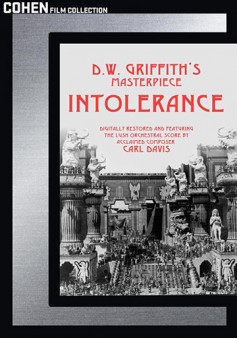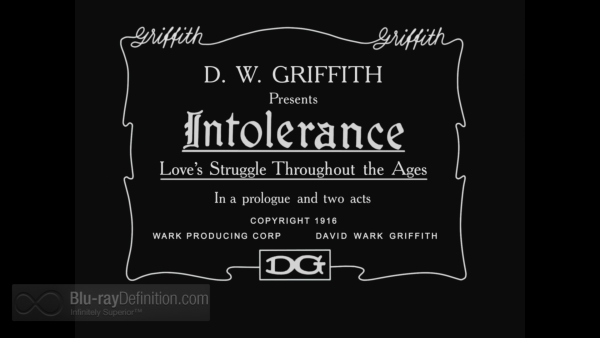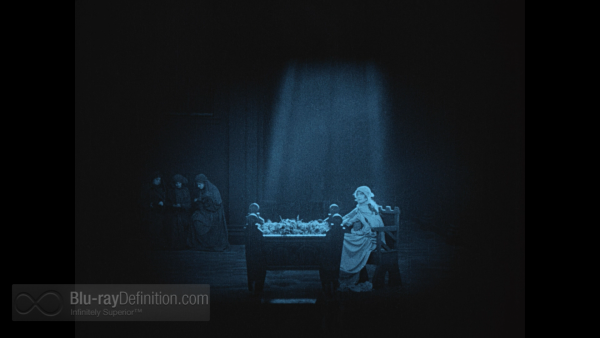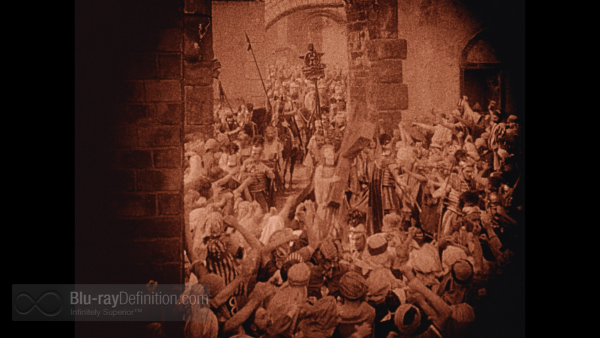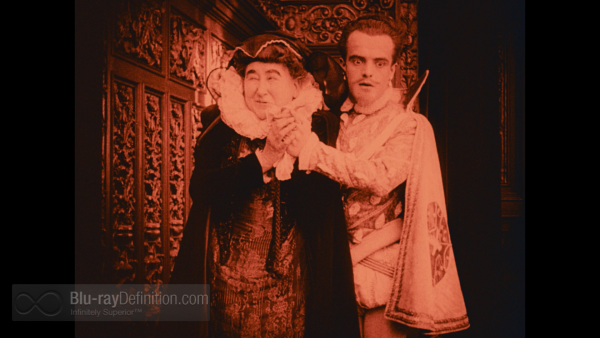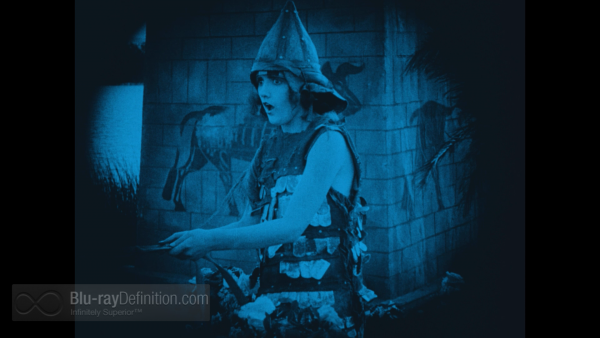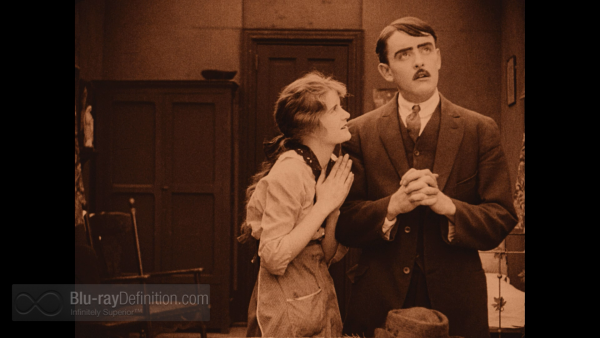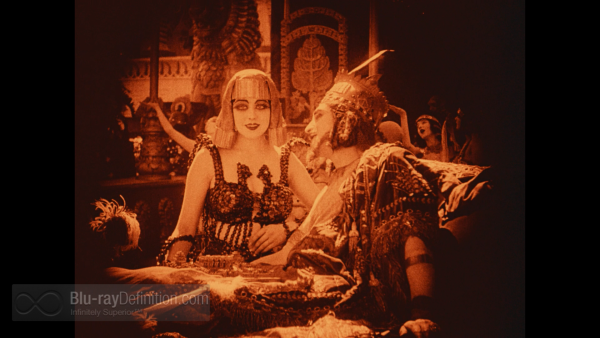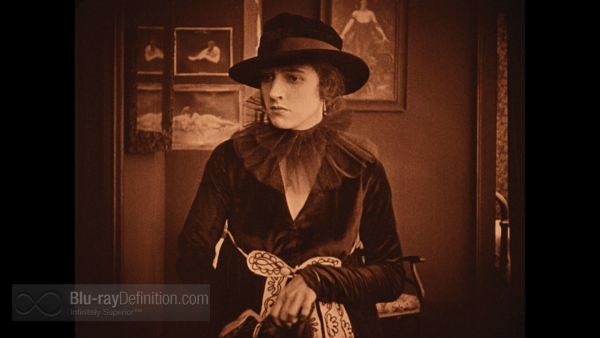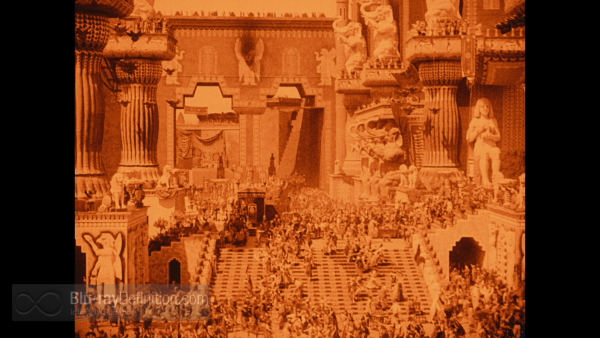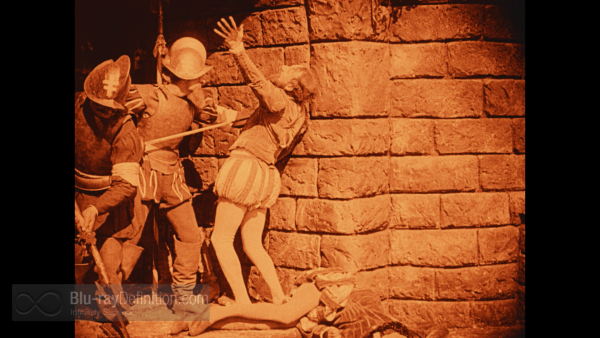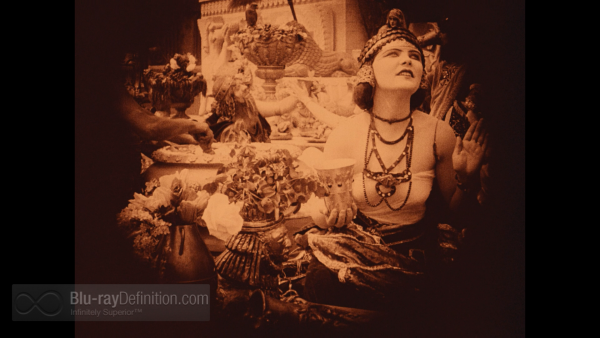– –
The Film
[Rating:4.5/5]
Once in every century or so, a film is made that so defies description or categorization that it transcends the medium altogether. D.W. Griffith, director of Birth of a Nation, achieved this status with his 1916 Intolerance. Quoting from the director himself, “Our play is made up of four separate stories, laid in different periods of history, each with its own set of characters. Each story shows how hatred and intolerance, through all ages, have battled against love and charity. Therefore, you will find our play turning from one of the four stories to another, as the common theme unfolds in each-out of the cradle endlessly rocking.”
Griffith begins with “The Modern Story,” an early 20th century American tale of social struggle between the lower classes and their bosses. A young family is driven apart by a labor strike following which the husband, wife, and child are parted, with nearly disastrous outcome before being reunited. The second, “The Babylonian Story,” takes place in 6th century B.C. Babylon during the conflict between Prince Cyrus (Persia) and Prince Belshazzar (Babylon). The third tale, “The Medieval Story” is set in 16th century France as the reigning Roman Catholics carry out a massacre on St. Batholomew’s Day upon the Catholics. The final chapter, “The Judean Story,” (the least presupposing of the lot) relates the events leading up to the crucifixion of Jesus Christ.
In the spirit of keeping his characters as archetypes, with the obvious exceptions of the Princes and Jesus, Griffith gives some of them names like The Dear One, The Boy (Modern Story), Musketeer of the Slums or Brown Eyes (Medieval Story), or Mountain Girl (Babylonian Story). The director’s intention was make the themes of each story more generalizable and less specific.
The cutting back and forth among the chapters is somewhat distracting at first but once you get into this film, this technique actually enhances the dramatic tension. While more attention is given to the two longer chapters (Modern Story and Babylonian Story), each gets its due when at the very moment of crisis, signaled by the motif of the mother rocking a cradle. With a cast featuring some of the leading actors of the time, Lillian Gish, Elmo Lincoln, Mae Marsh, Robert Harron, and Constance Talmadge, and script by Griffith himself abetted by Tod Browning, Anita Loos and Frank E. Woods, this is an absolute must-watch for all film fans. A century later, Intolerance still has the power to provoke and move its audiences.
Video Quality
[Rating:3/5]
Whether deliberate or due to working with different film sources, there is considerable alternation between black-and-white and sepia-hued scenes. That aside, this film is nearly a century old and, the 2K digital restoration is something short of astounding. Some of the larger outdoor scenes are blurry and grainy but many of the close ups defy the age of this print. Of course, Griffith’s camera crew was considerably ahead of its time in 1916 and we get to see many effects that were not used by other directors for quite some time. In fact, there is considerable foreshadowing of cinematic style that was later used for epics like The Ten Commandments, Ben Hur, and Cleopatra.
Audio Quality
[Rating:4/5]
There are two soundtracks, a DTS-HD Master Audio 5.1 surround version and a LPCM Stereo option. Both are good, but the former has a slight edge in atmosphere.
Supplemental Materials
[Rating:5/5]
The bonus materials are quite generous and include two feature films that were derived from the original release. Both are scored by the Mont Alto Motion Picture Orchestra.
- The Mother and The Law (1:39:12) (English LPCM Stereo 48kHz/24-bit ): a full-length feature derived from The Modern Story. It is basically the heavy-handed title-boarded version with extensive social messaging.
- The Fall of Babylon (1:02:34): (English LPCM Stereo 48kHz/24-bit)
- Restoration Trailer (2:08) (English LPCM Stereo 48kHz/24-bit)
- Three Hours that Shook the World: Observations on Intolerance (19:02) (English LPCM Stereo 48 kHz/24-bit). Commentary by film historian Kevin Brownlow.
- New Essays by Cineaste magazine editor Richard Porton and historian William M. Drew.
The Definitive Word
Overall:
[Rating:4.5/5]
Film critics have called Intolerance one of the greatest, if not the greatest, film ever made. Certainly it was movie-making on a scale that had not been seen since Griffith’s previous cinematic extravaganza, The Birth of a Nation. Taking on one controversial subject after another like oppression of laborers by wealthy businessmen, religious discrimination, and capital punishment, this is one fascinating film. The dramatic style, typical of the over-emoting of silent screen actors, is obviously dated yet still fascinating.
Additional Screen Captures
[amazon-product]B00EVU3SO0[/amazon-product]
[amazon-product]B00EVU3SO0[/amazon-product]


